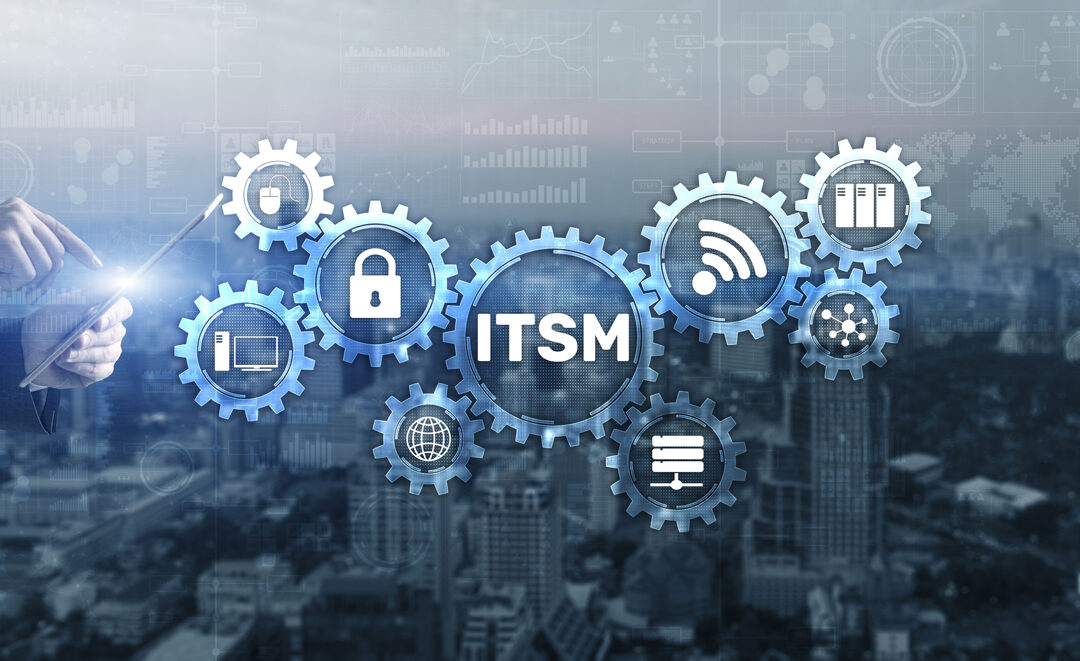2024 is shaping up to be a year full of challenges and innovations for ITSM, with Artificial intelligence, Cloud, cybersecurity…
New trends are emerging and are set to reshape the landscape of the sector. These transformations promise to be as profound as they are challenging for ITSM: focus on the 6main trends to anticipate in 2024.
1. Reconciling AI and humans
Artificial intelligence continues to revolutionize ITSM practices. “Deep-learning” makes it possible to go even further in the automation of processes (routing and resolution of tickets, predictive analysis of customer support, etc.) Properly trained, AI is capable of analyzing weak signals within systems, to anticipate needs and trigger appropriate interventions, with ever faster and cheaper results.
The natural language model (LLM) is pushing the level of personalized service even further, since it integrates with user interaction, via chatbots and search engines. AI is gradually emerging as a central tool in ITSM strategies, promising to continuously improve the efficiency and responsiveness of services.
However, AI alone is not enough. A balance must be found between technology and humans. The challenge for service centers is not to equip themselves with an ITSM tool integrating the most advanced AI technologies, but to choose the one that will integrate the best with their existing processes. To excel in customer satisfaction, AI must be supported and trained by the expertise of employees, in exchange for improvement in their efficiency
and reduce their pain points.
2. Structuring the rise of the Cloud
The adoption of Cloud solutions is becoming well established and is experiencing a significant acceleration. In 2023, 94% of companies use at least one Cloud service (Cloud Computing Statistics and Trends 2023 – 2024, Lambert Consulting). Not only are they flexible and scalable, but are also more cost-effective than on-premise solutions, better aligning with the real needs of organizations and reducing expenses related to infrastructure, licensing, and internal skills development.
These Cloud solutions bring with them new management needs which need to be structured and managed effectively. The continuity in Cloud adoption therefore represents a growth opportunity for service centers and IT services companies.
The management and integration of Cloud services should be considered as crucial elements for the growth of ITSM companies.
3. Growing security needs
In 2024, protecting critical infrastructure and sensitive data will be a key component of ITSM strategies. As cyber threats intensify, ITSM must put security at the top of its agenda. Audits, robust security measures, and regulatory compliance are more important than ever.
In this regard, the SecNumCloud standard, developed by the ANSSI, proposes a set of security rules to be respected. This framework guarantees a high level of requirements for Cloud service providers, both in terms of the robustness of the solution in the face of cyberattacks and the rigor of the methods used. Suppliers in the market holding this certification, are identified as a robust, reliable and trusted solution.
4. Taking care of the user experience for customers, but also for employees
If customers demand an ever richer and more intuitive experience, so do employees. 73% of employees consider their own experience to be crucial, according to the SysAid 2023 State of Service Management. They expect processes and tools that are smoother, more ergonomic, faster and more intuitive.
ITSM can no longer be satisfied with offering a minimum service. Customers and employees expect to find real added value and smooth operation.
User portal, self-service systems such as chatbots and FAQs, reduced response times, more responsive and personalized support… In 2024, the ITSM solution takes on the role of reducing pain points and improving user comfort.
5. Sustainability in the spotlight
CSR (Corporate Social Responsibility) is becoming increasingly important in corporate strategies. It’s critical that IT operations align with their sustainability goals. Every aspect of IT, from data management to infrastructure, needs to be evaluated and adjusted to meet sustainability and environmental efficiency criteria.
In this context, ITSM plays a crucial role in optimizing the management of IT resources. It monitors and controls the life cycle of all IT equipment and infrastructure components. ITSM is therefore positioned not only as a performance lever but also as a pillar of companies’ sustainable approach.
6. ITSM at the service of ESM (Enterprise service management)
ITSM is no longer limited to traditional IT service management and is now expanding across the enterprise. Human Resources, Finance, Supply Chain… Thanks to their oftenunsuspected flexibility, the functionalities initially dedicated to the IT management of ITSM tools can be transposed to other services and needs. At all levels, ITSM marks a transition to integrated and holistic management, allowing for better coordination of business resources
and increased overall performance.
| Examples Applied to Human Resources, ITSM tools support the management of recruitment and training processes. This will result in the automatic booking of meeting rooms or the unified management of agendas and interview schedules. On the finance side, ITSM provides analytics and predictions that make it easier to track expenses and budgets. |
2024 promises to be full of challenges, but also of rewarding opportunities for users of ITSM solutions. Agility and innovation will be the key words when navigating market changes.
In order to be more flexible, keep up to date about the latest trends in the sector!

